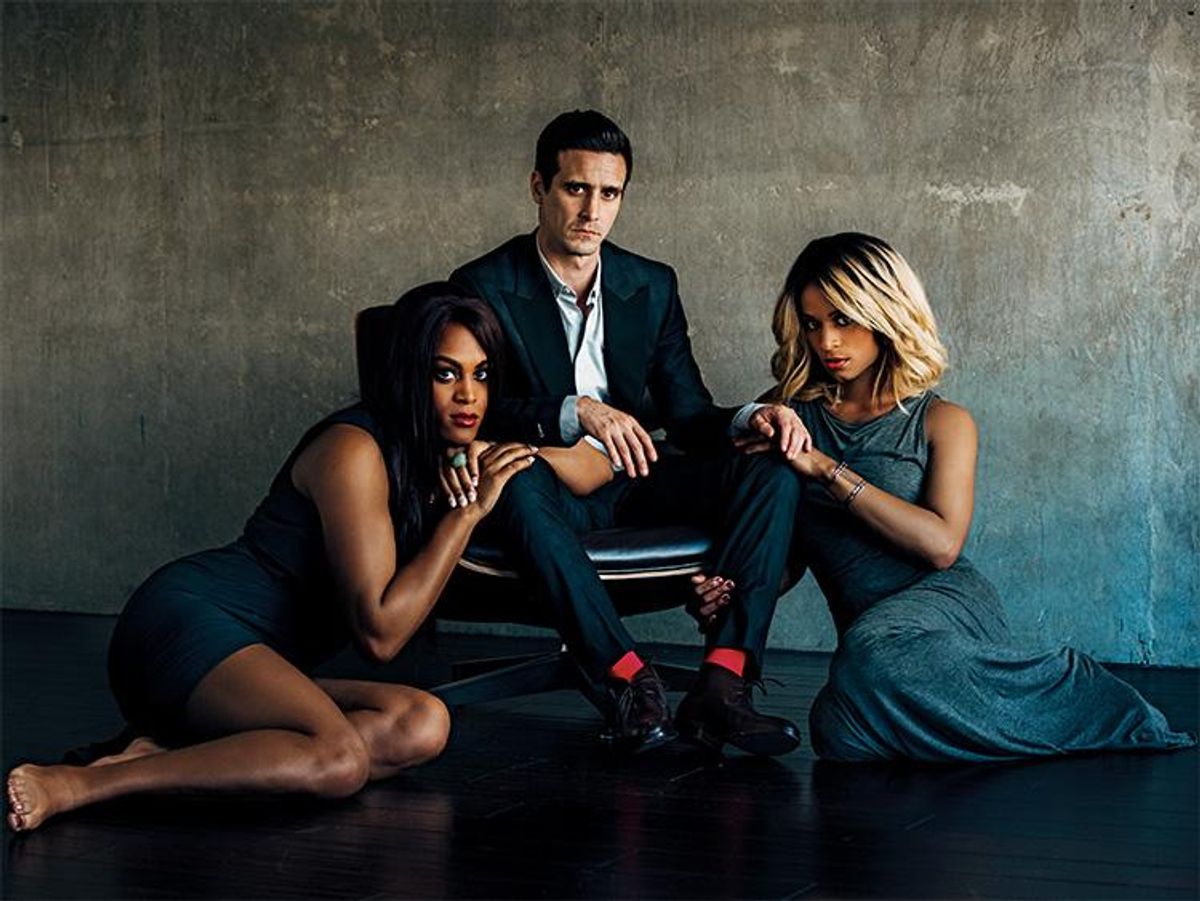From left: Mya Taylor, James Ransone, and Kitana Kiki Rodriguez. Photography by Nicholas Maggio. Styling by Alison Brooks. Hair: Candace Bossendorfer at Exclusive Artists. Makeup: Agostina at Exclusive Artists. Producer: Richard Villani. James: Suit by Klein Epstein & Parker, shirt by Dior Homme, shoes by Tommy Hi. Mya: Dress by Haute Hippie. Kitana: Dress by A.L.C.
"Merry Christmas Eve, bitch." That's the line that opens director Sean Baker's stirring new film, Tangerine. It's vulgar and funny and sweet, and it's delivered by a transgender Los Angeles prostitute named Alexandra, played with marvelous ease by newcomer Mya Taylor, as she presents her best friend and fellow trans sex worker, Sin-Dee, with a sprinkled doughnut. Set in a sad little fast-food joint, the moment also establishes their relationship: We soon discover that this offering, and each other, are virtually all these women have.
Tangerine's premise is quite simple: As they sit at Donut Time during the holidays, Alexandra reveals that Sin-Dee's lover and pimp, Chester, was cheating on her with a "fish" (slang for a cisgender woman) while she was locked up in prison for 28 days. The news enrages Sin-Dee -- a foul-mouthed wrecking ball that Kitana Kiki Rodriguez, another newcomer, was seemingly born to play -- so much so that the scorned spitfire decides to storm through the sordid streets near the intersection of Highland Avenue and Santa Monica Boulevard to hunt down Chester and his new fling. Along the way, we meet an array of call girls and meth heads, and Razmik (Karren Karagulian), an Armenian-American cabbie who sleeps with trans hookers (including Alexandra) during his shifts and then returns home to his wife and infant.
At times, the film possesses an unhinged, camp sensibility a la John Waters or The Jerry Springer Show (expect an abundance of cursing, hair-pulling, and trash-talking, as well as a metaphorical car-wash fellatio scene that's as subtle as a flying stiletto). Yet its rawness and lived-in performances, and the way that Baker conveys his characters' clashes and mishaps without bias or judgment, elevate Tangerine from a farcical, exploitative romp to a poignant, empathetic look at life on the outskirts.
"The storyline is connected to something very serious," says Taylor, a Houston-born transgender club performer whom Baker befriended at the LGBT Center in Hollywood. When he expressed his interest in profiling her neighborhood, notorious for its illegal activity, Taylor was immediately drawn to the idea. She, Baker, and co-screenwriter Chris Bergoch soon began researching the area, interviewing the trans prostitutes who roam its blocks. "I took the movie as an opportunity to showcase what really goes on and try to get the word out," Taylor says. "This is what's happening here, and it needs to stop."
Taylor introduced Baker and Bergoch to Rodriguez, a friend and trans advocate, who, through her work as a health educator at an HIV/AIDS research center, was also very familiar with the film's illicit backdrop. "This was a chance to show a part of the world that people rarely acknowledge," says Rodriguez. "I also love that Sean and the crew were so comfortable working with girls like us, because a lot of people seem to ostracize us. I was happy he gave us the opportunity to make Tangerine the way we wanted -- by holding nothing back."
Accentuating his leads' often improvisational acting is Baker's bold, novel shooting technique: The entire movie was captured on iPhone 5s, lending Tangerine an intimate, fly-on-the-wall quality. As the cameras follow Sin-Dee and Alexandra, their movements often soundtracked by deep, pulsing EDM, the pair's various encounters are jerky, intense, and almost too close for comfort. The furtive style of filming also granted Baker and his team access that typical equipment wouldn't allow. Viewers are immersed in the tale's squalid spaces, rendering the action all the more gripping and real.
"This is a contribution to American film as an art form," says James Ransone, a two-time Baker collaborator who plays Chester, and manages to make the oily, thuggish manipulator strangely charming. "All these gigantic studio movies are event things. I miss movies like Tangerine. I thought, Here's another way to humanize an otherwise marginalized culture that is taboo in American society. That's how we tend to accept what might otherwise seem foreign to people -- by humanizing it."
Taylor says she relates to her character's struggle, specifically citing the challenge she's faced trying to secure work while transitioning. "I had applied for 186 jobs in one month, and at the time I wasn't doing that well with money," she explains. "I'd gotten a ticket, and the state wouldn't let me get my name changed legally until that was paid. So whenever I'd go and apply for a job, they'd see the name was a male name, but it didn't match up with what I look like. It really prevented me from getting a lot of jobs. Take that and translate it to the street with these girls. I've seen some of them get dressed up and go on interviews, but they're not getting the jobs. So they resort to sex work, because it's fast and easy money."
While its release comes at a pivotal time -- new TV series like Transparent and Orange Is the New Black, with Laverne Cox, have placed trans characters front and center -- Tangerine could be interpreted as a step backward: Transgender women have long been associated with prostitution, primarily because of how they've been represented in the media. But Taylor doesn't see it that way. "I'm not saying that every trans woman does sex work," she says. "But this is real. It happens, and it needs to be addressed."
Ransone echoes her sentiments. "What's being depicted might not fit into the safe worldview of how you want Laverne Cox to be presented to you as a trans person," he says, "but by denying the experience of trans sex workers, we are denying that the problem still exists."
Tangerine is in theaters July 10. Watch the red band trailer below:

























































































